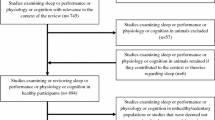Abstract
Using Canadian time use data, we exploit variation in local unemployment rates to investigate the cyclical nature of sleep time and show that for both men and women, sleep time decreases when the economy is doing relatively better. Our results suggest that in a recession Canadians sleep an average of 3 h more per week, or 26 min more per day. Given the importance of even small changes in sleep time on measures of cognitive functioning such as reaction time and concentration, our findings may help explain the countercyclical nature of mortality. Further, as we find that sleep is affected by the same economic variables (notably the unemployment rate) that affect market work time, our results also contribute to the limited literature that shows that sleep time should not be treated as exogenously determined, but, like any other resource, determined by its relative cost.
Similar content being viewed by others
References
Angrist JD, Pischke JS (2009) Mostly harmless econometrics: an empiricist’s companion. Princeton University Press, Princeton
Banks S, Dinges DF (2007) Behavioral and physiological consequences of sleep restriction. J Clin Sleep Med 3(5): 519–528
Becker GS (1965) A theory of the allocation of time. Econ J 75(299): 493–517
Bertrand M, Duflo E, Mullainathan S (2004) How much should we trust differences-in-differences estimates?. Q J Econ 119(1): 249–275
Biddle JE, Hamermesh DS (1990) Sleep and the allocation of time. J Political Econ 98(5): 922–943
Coren S (1996) Sleep Thieves. Free Press, New York
Epstein R, Chillag N, Lavie P (1998) Starting times of school: effects on daytime functioning of fifth-grade children in Israel. Sleep 21(3): 250–256
Gerdtham UG, Ruhm CJ (2006) Deaths rise in good economic times: Evidence from the OECD. Econ Hum Biol 4(3): 298–316
Hicks R, Lyndseth K, Hawkins J (1983) Daylight-saving time changes increase traffic accidents. Percept Mot Skills 56(1): 64–66
Kamstra MJ, Kramer LA, Levi MD (2000) Losing sleep at the market: The daylight saving anomaly. Am Econ Rev 90(4): 1005–1011
Knipling RR, Wang J (1994) Crashes and fatalities related to driver drowsiness/fatigue. Research note, Department of Transportation, National Highway Traffic Safety Administration, Washington
Landrigan CP, Rothschild JM, Cronin JW, Kaushal R, Burdick E, Katz J, Lilly CM, Stone PH, Lockley SW, Bates DW, Czeisler CA (2004) Effects of reducing interns’ work hours on serious medical errors in intensive care units. New Engl J Med 351(18): 1838–1848
Miller DL, Page ME, Stevens AH, Filipski M (2009) Why are recessions good for your health. Am Econ Rev 99(2): 122–127
Monk TH (1980) Traffic accident increases as a possible indicant of desynchronosis. Cronobiologica 7(4): 527–529
Oreopoulos P, Wachter Tv, Heisz A (2008) The short- and long-term career effects of graduating in a recession: hysteresis and heterogeneity in the market for college graduates. IZA Discussion Papers 3578
Phipps S, Burton P, Lethbridge L (2001) In and out of the labour market: long-term income consequences of child-related interruptions to women’s paid work. Can J Econ 34(2): 411–429
Powell NB, Schechtman KB, Riley RW, Li K, Troell R, Guilleminault C (2001) The road to danger: The comparative risks of driving while sleepy. Laryngoscope 111(5): 887–893
Ruhm CJ (2000) Are recessions good for your health. Q J Econ 115(2): 617–650
Ruhm CJ (2003) Good times make you sick. J Health Econ 22(4): 637–658
Ruhm CJ (2007) A healthy economy can break your heart. Demography 44(4): 829–848
Ruhm CJ, Black WE (2002) Does drinking really decrease in bad times. J Health Econ 21(4): 659–678
Szalontai G (2006) The demand for sleep: A South African study. Econ Model 23(5): 854–874
Author information
Authors and Affiliations
Corresponding author
Rights and permissions
About this article
Cite this article
Brochu, P., Armstrong, C.D. & Morin, LP. The ‘trendiness’ of sleep: an empirical investigation into the cyclical nature of sleep time. Empir Econ 43, 891–913 (2012). https://doi.org/10.1007/s00181-011-0508-6
Received:
Accepted:
Published:
Issue Date:
DOI: https://doi.org/10.1007/s00181-011-0508-6




